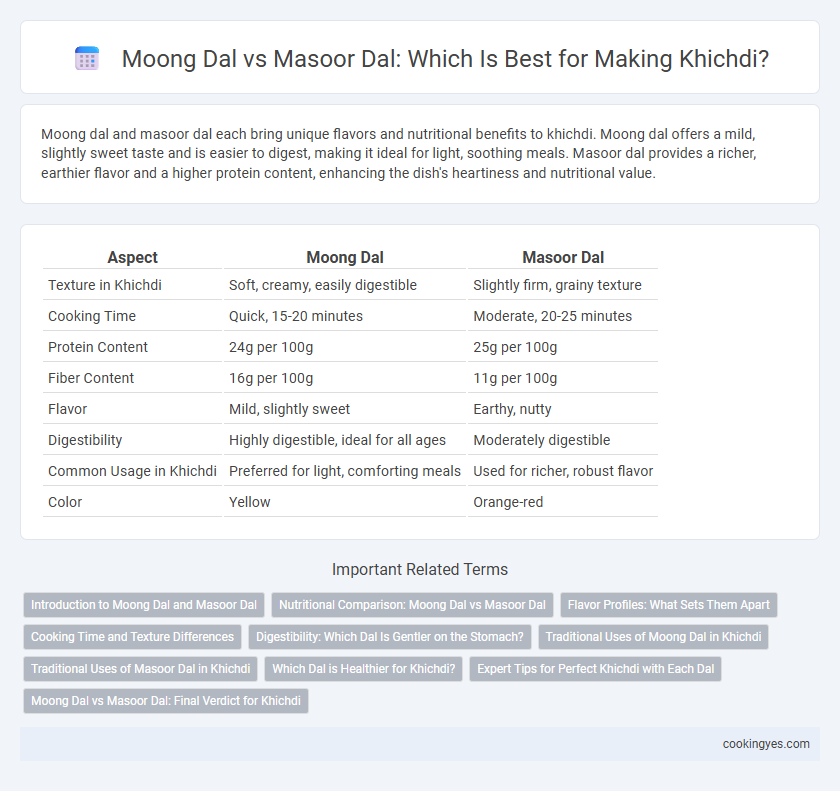Moong dal and masoor dal each bring unique flavors and nutritional benefits to khichdi. Moong dal offers a mild, slightly sweet taste and is easier to digest, making it ideal for light, soothing meals. Masoor dal provides a richer, earthier flavor and a higher protein content, enhancing the dish's heartiness and nutritional value.
Table of Comparison
| Aspect | Moong Dal | Masoor Dal |
|---|---|---|
| Texture in Khichdi | Soft, creamy, easily digestible | Slightly firm, grainy texture |
| Cooking Time | Quick, 15-20 minutes | Moderate, 20-25 minutes |
| Protein Content | 24g per 100g | 25g per 100g |
| Fiber Content | 16g per 100g | 11g per 100g |
| Flavor | Mild, slightly sweet | Earthy, nutty |
| Digestibility | Highly digestible, ideal for all ages | Moderately digestible |
| Common Usage in Khichdi | Preferred for light, comforting meals | Used for richer, robust flavor |
| Color | Yellow | Orange-red |
Introduction to Moong Dal and Masoor Dal
Moong Dal, or split green gram, is a staple legume known for its high protein content and quick cooking time, making it ideal for light, nutritious khichdi. Masoor Dal, or red lentils, offers a slightly earthier flavor and softer texture when cooked, contributing to a heartier khichdi experience. Both dals provide essential nutrients like iron, fiber, and B vitamins, but Moong Dal is often preferred for its digestibility and mild taste.
Nutritional Comparison: Moong Dal vs Masoor Dal
Moong Dal contains higher protein content, approximately 24 grams per 100 grams, compared to Masoor Dal's 22 grams, making it a preferred choice for muscle repair and growth in khichdi. Masoor Dal offers more iron, around 6.1 mg per 100 grams, which supports better red blood cell production and prevents anemia. Both dals provide essential fiber and low-fat content, but Moong Dal is richer in antioxidants and Vitamin C, enhancing immunity and digestion in khichdi recipes.
Flavor Profiles: What Sets Them Apart
Moong dal offers a mild, slightly sweet flavor that blends seamlessly into khichdi, creating a delicate and comforting taste. Masoor dal delivers a richer, earthier flavor with a hint of nuttiness, adding depth and a heartier essence to the dish. The subtle sweetness of moong dal contrasts with the robust, robust profile of masoor dal, influencing the overall flavor experience in khichdi preparation.
Cooking Time and Texture Differences
Moong dal cooks faster than masoor dal, typically requiring 15-20 minutes compared to masoor dal's 25-30 minutes, making it ideal for quick khichdi preparation. The texture of moong dal is softer and creamier when cooked, enhancing the smoothness of khichdi, while masoor dal tends to hold its shape slightly, providing a firmer bite. Choosing moong dal results in a fluffier khichdi, whereas masoor dal adds a distinct, nutty flavor with a heartier texture.
Digestibility: Which Dal Is Gentler on the Stomach?
Moong Dal is widely recognized for its superior digestibility and is gentler on the stomach compared to Masoor Dal, making it an ideal choice for khichdi, especially for those with sensitive digestive systems. Its low fiber content and easy-to-break-down proteins ensure quick absorption and minimal gastric discomfort. In contrast, Masoor Dal contains slightly higher fiber and complex proteins, which may lead to slower digestion and potential bloating in sensitive individuals.
Traditional Uses of Moong Dal in Khichdi
Moong Dal is traditionally preferred in Khichdi for its easy digestibility and balanced nutritional profile, providing a rich source of protein and essential vitamins. It imparts a soft texture and mild flavor, enhancing the comfort-food quality of Khichdi, especially in Ayurvedic practices. Masoor Dal, while nutritious, is less commonly used in Khichdi due to its firmer texture and stronger taste that contrasts with Moong Dal's smooth consistency.
Traditional Uses of Masoor Dal in Khichdi
Masoor dal is traditionally preferred in khichdi for its quick cooking time and rich, earthy flavor that enhances the dish's comfort-food appeal. Its soft texture blends seamlessly with rice, creating a smooth and hearty consistency ideal for digestion and light meals. Rich in protein, iron, and folate, masoor dal supports nutritional balance in khichdi, making it a staple in Indian households for easy, wholesome nutrition.
Which Dal is Healthier for Khichdi?
Moong Dal is considered healthier for khichdi due to its high protein content, easy digestibility, and low glycemic index, making it ideal for balanced nutrition and weight management. Masoor Dal offers a good protein source and rich iron content but can be slightly harder to digest compared to Moong Dal. Choosing Moong Dal enhances the nutrient density of khichdi while supporting better digestive health and sustained energy release.
Expert Tips for Perfect Khichdi with Each Dal
Moong Dal's delicate texture and quick cooking time make it ideal for khichdi, offering a smooth and creamy consistency favored by culinary experts. Masoor Dal imparts a robust flavor and vibrant color, enriching khichdi with a hearty taste and slightly firm bite preferred for a more substantial dish. For perfect khichdi, chefs recommend soaking moong dal for 30 minutes to enhance softness, while masoor dal requires a slower simmer to achieve tenderness without losing its shape.
Moong Dal vs Masoor Dal: Final Verdict for Khichdi
Moong dal is preferred for khichdi due to its easy digestibility, light texture, and mild flavor, which blends well with rice and spices. Masoor dal, while richer in iron and protein, has a slightly stronger taste and takes longer to cook, affecting the typical softness of khichdi. For a traditional, soothing khichdi, moong dal offers a balanced, easily digestible option that enhances both nutrition and flavor.
Moong Dal vs Masoor Dal for Khichdi Infographic

 cookingyes.com
cookingyes.com